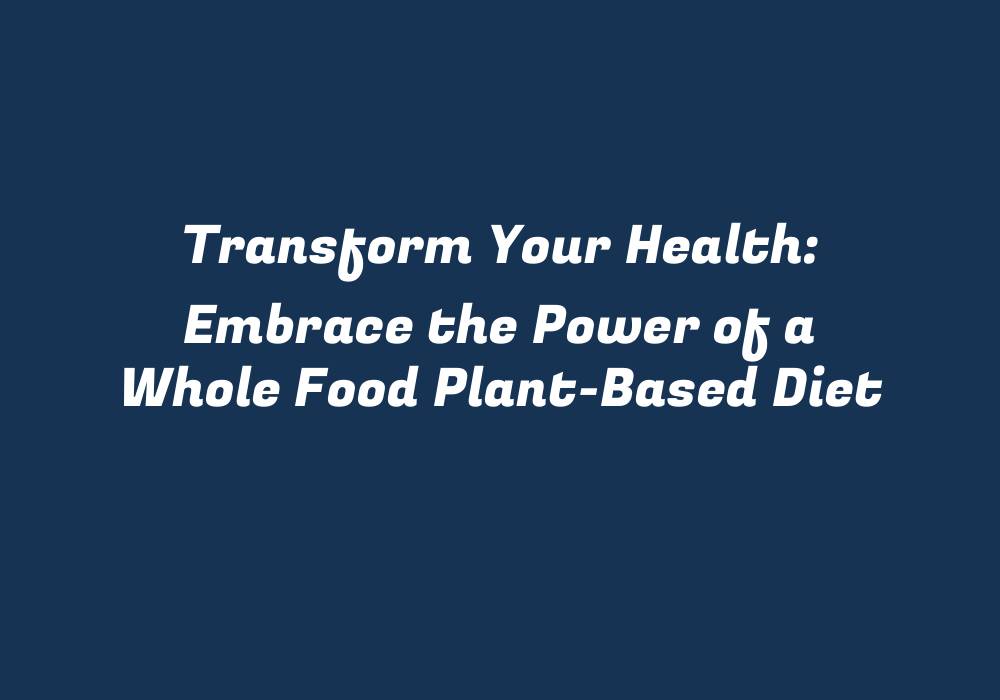Introduction: Transform Your Health with a Whole Food Plant-Based Diet
In today’s fast-paced world, we are often caught up in the daily grind, neglecting our health. It is crucial to make conscious efforts to transform our lifestyles and embrace healthy habits for an improved quality of life. A whole food plant-based diet offers a practical yet powerful approach towards enhancing our overall wellbeing.
What Is a Whole Food Plant-Based Diet?
A whole food plant-based diet consists primarily of unprocessed, minimally refined foods from plants. It is different from a vegan or vegetarian diet in that it does not focus on excluding any specific food group but rather promotes consuming an abundance of fruits, vegetables, whole grains, legumes, nuts, and seeds for optimal health.
Benefits of a Whole Food Plant-Based Diet
Improved Heart Health
One of the main advantages of embracing a whole food plant-based diet is its positive impact on heart health. According to research, eating foods rich in fruits, vegetables, legumes, and whole grains has been linked with lower risks of cardiovascular diseases such as heart attacks and strokes.
Weight Management
Consuming a high-fiber diet from plant sources can aid in weight management by promoting satiety. The fiber-rich foods found in this lifestyle provide a slower release of energy, keeping you feeling full for longer periods.
Enhanced Digestive Health
A whole food plant-based diet is rich in prebiotics and probiotics which can improve digestion by promoting the growth of beneficial gut bacteria. This healthy microbiome supports proper nutrient absorption, reduces inflammation, and even boosts immune function.
Reduced Risk of Chronic Diseases
The consumption of a variety of plant-based foods is associated with a lower risk of developing chronic diseases like type 2 diabetes, certain types of cancer, and even Alzheimer’s disease. A diet high in whole grains, legumes, fruits, vegetables, nuts, and seeds can help maintain optimal blood sugar levels and protect against cellular damage.
Sustainable Food Choices
By adopting a plant-based diet, you are making environmentally conscious choices that contribute to sustainable food production. Plant-based foods require fewer resources and generate less greenhouse gas emissions compared to animal-based products.
Transitioning to a Whole Food Plant-Based Diet
Start Slowly and Gradually
As with any significant lifestyle change, it is essential to approach your transition gently. Begin by incorporating more fruits and vegetables into each meal gradually while reducing the consumption of processed foods and animal products. Allow yourself time to adapt and adjust your preferences accordingly.
Experiment with a Variety of Plant-Based Dishes
Explore different culinary techniques, recipes, and cuisines that incorporate whole food plant-based ingredients. This will help maintain interest in your new dietary choices while ensuring you receive the nutrients needed for optimal health.
Stock Your Kitchen with Healthy Foods
Ensure that your kitchen is well-stocked with fresh fruits, vegetables, whole grains, legumes, and nuts. These staples will make it easier to create satisfying plant-based meals at home and avoid temptations for unhealthy options.
Conclusion
Embracing a whole food plant-based diet can bring numerous benefits for your physical, mental, and emotional wellbeing. By incorporating this lifestyle change, you will not only improve your own health but also contribute to the sustainability of our planet. So, start nourishing yourself with the power of plants today and transform your life for the better.
Frequently Asked Questions
Is a whole food plant-based diet suitable for everyone?
While the benefits of this lifestyle choice are numerous, it is essential to consider individual needs and circumstances. Consult with your healthcare provider or a registered dietitian before making significant changes to your diet.
How do I address nutrient deficiencies in a plant-based diet?
A properly planned whole food plant-based diet can provide all the necessary vitamins, minerals, and macronutrients. However, it is crucial to pay attention to your nutritional intake and consult with professionals if you have concerns about meeting your body’s specific requirements.
Can I still eat out while following a whole food plant-based diet?
Yes, with some planning and awareness of the menu options available at restaurants, it is possible to enjoy meals outside your home. Look for establishments that offer vegetarian or vegan dishes made from whole foods, ensuring you still benefit from the health advantages of this lifestyle choice.
Is it necessary to completely avoid animal products when following a plant-based diet?
While focusing on whole food plant-based ingredients is essential for optimizing your overall wellbeing, there can be some exceptions. For example, consuming small amounts of sustainably sourced seafood or dairy products from grass-fed animals in moderation may be acceptable for certain individuals. Consult with a healthcare professional to determine what works best for you.
How can I ensure proper protein intake on a plant-based diet?
A whole food plant-based diet provides ample sources of plant-based proteins, such as legumes, nuts, seeds, and whole grains. By combining different plant foods throughout the day, you can create meals that are both nutritionally balanced and protein-rich.
